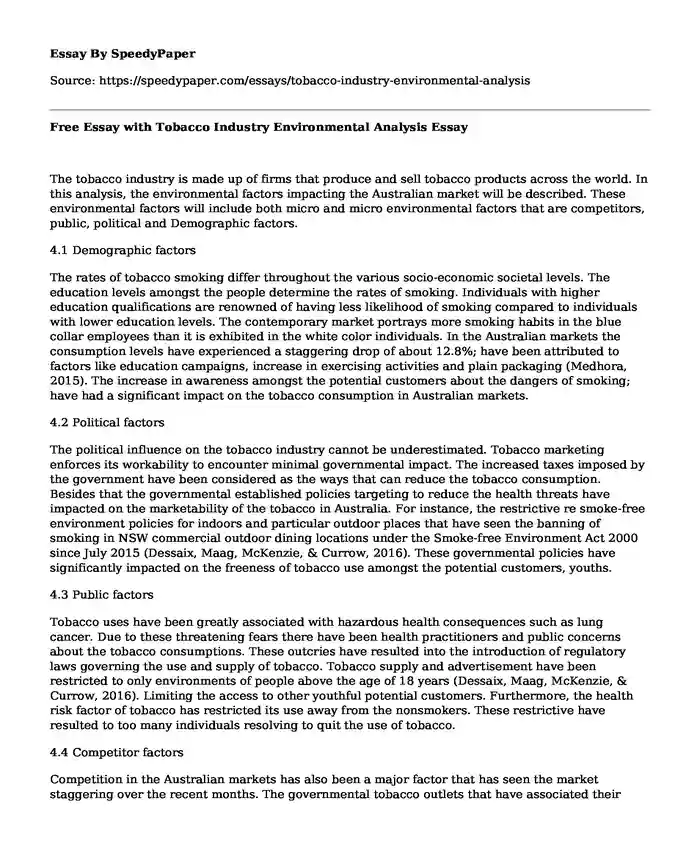The tobacco industry is made up of firms that produce and sell tobacco products across the world. In this analysis, the environmental factors impacting the Australian market will be described. These environmental factors will include both micro and micro environmental factors that are competitors, public, political and Demographic factors.
4.1 Demographic factors
The rates of tobacco smoking differ throughout the various socio-economic societal levels. The education levels amongst the people determine the rates of smoking. Individuals with higher education qualifications are renowned of having less likelihood of smoking compared to individuals with lower education levels. The contemporary market portrays more smoking habits in the blue collar employees than it is exhibited in the white color individuals. In the Australian markets the consumption levels have experienced a staggering drop of about 12.8%; have been attributed to factors like education campaigns, increase in exercising activities and plain packaging (Medhora, 2015). The increase in awareness amongst the potential customers about the dangers of smoking; have had a significant impact on the tobacco consumption in Australian markets.
4.2 Political factors
The political influence on the tobacco industry cannot be underestimated. Tobacco marketing enforces its workability to encounter minimal governmental impact. The increased taxes imposed by the government have been considered as the ways that can reduce the tobacco consumption. Besides that the governmental established policies targeting to reduce the health threats have impacted on the marketability of the tobacco in Australia. For instance, the restrictive re smoke-free environment policies for indoors and particular outdoor places that have seen the banning of smoking in NSW commercial outdoor dining locations under the Smoke-free Environment Act 2000 since July 2015 (Dessaix, Maag, McKenzie, & Currow, 2016). These governmental policies have significantly impacted on the freeness of tobacco use amongst the potential customers, youths.
4.3 Public factors
Tobacco uses have been greatly associated with hazardous health consequences such as lung cancer. Due to these threatening fears there have been health practitioners and public concerns about the tobacco consumptions. These outcries have resulted into the introduction of regulatory laws governing the use and supply of tobacco. Tobacco supply and advertisement have been restricted to only environments of people above the age of 18 years (Dessaix, Maag, McKenzie, & Currow, 2016). Limiting the access to other youthful potential customers. Furthermore, the health risk factor of tobacco has restricted its use away from the nonsmokers. These restrictive have resulted to too many individuals resolving to quit the use of tobacco.
4.4 Competitor factors
Competition in the Australian markets has also been a major factor that has seen the market staggering over the recent months. The governmental tobacco outlets that have associated their drop in sells to the plain packaging issue have also encountered fall in sells due to competition. Since the cigarette prices have been hiked by the government to reduce the consumption rates the customers have resorted for other outlets providing the commodities at pocket-friendly prices. In a an article published by Medhora, a spokesman for the British American Tobacco Australia reportedly revealed that the reduction of tobacco consumption by 12% in 2015 was due to the hiked governmental prices. The outcome of these prices led to many smokers buying cigarettes in the black markets and going for the cheaper brands (Medhora, 2015). As a factor of concern, competition in any market is supposed to be free and fair, therefore, the existence of the black-markets offering these commodities at a cheaper price than expected so as to win customers derails the potential of other outlets withstanding the fluctuating market. The tobacco marketers are likely to opt majoring in selling of low quality cigarettes that customers could afford than high quality that attracts just a small mass of their customers.
References
Dessaix, A., Maag, A., McKenzie, J., & Currow, D. C. (2016). Factors influencing reductions in smoking among Australian adolescents. Retreived from: http://www.phrp.com.au/wp-content/uploads/2016/01/PHRP-26-01-Youth-FINAL-01-20Jan16.pdf. Public Health Research & Practice January 2016; Vol. 26(1), 1-4.
Medhora, S. (2015). Plain packaging to thank for Australia's decline in smoking, says Labor. Retrieved from: https://www.theguardian.com/society/2015/mar/12/plain-packaging-to-thank-for-australias-decline-in-smoking-says-labor. The Guardian, 1-7.
Cite this page
Free Essay with Tobacco Industry Environmental Analysis. (2019, Oct 16). Retrieved from https://speedypaper.net/essays/tobacco-industry-environmental-analysis
Request Removal
If you are the original author of this essay and no longer wish to have it published on the SpeedyPaper website, please click below to request its removal:
- Literary Essay with the Analysis of Macbeth
- Essay Example with an Ethics Course Reflection
- My Initial Reaction in Finding Out My Top Five Strengths
- Free Paper Sample: Work-Family Conflict Impact on Job Satisfaction of Correctional Officers
- Essay Sample. Post-Civil War America
- Free Essay - Funding Types and Option
- Free Essay. The Health Belief Model Posits
Popular categories





